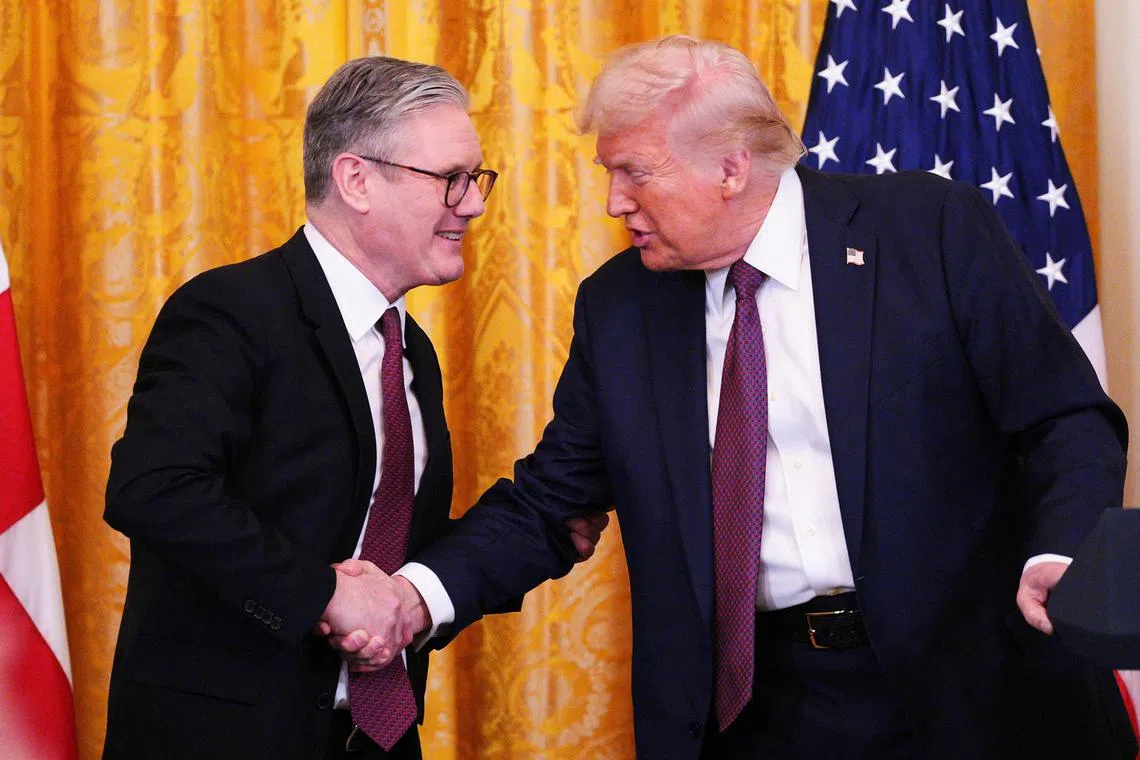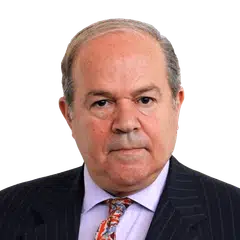News analysis
Much flummery from Starmer, but still no security guarantee on Ukraine from Trump
Sign up now: Get ST's newsletters delivered to your inbox

British Prime Minister Keir Starmer and President Donald Trump at a joint press conference at the White House on Feb 27.
PHOTO: REUTERS
LONDON - British Prime Minister Keir Starmer followed in the footsteps of French President Emmanuel Macron
Unlike Mr Macron, who relied more on personal charm to make his arguments on behalf of Ukraine, the British leader concentrated primarily on flattering Mr Donald Trump with various gestures, including delivering a personal letter from King Charles III, Britain’s monarch.
But like Mr Macron, Mr Starmer went home without a clear US commitment to how Washington would handle the Ukraine war.
Mr Trump stunned Europe when, after a phone call with Russian President Vladimir Putin on Feb 12,
Worse still, Mr Trump appeared to concede most of what Russia wanted from Ukraine even before the talks started.
In return for an eventual agreement to a ceasefire, officials of the Trump administration conceded that Russia could keep the 20 per cent of Ukrainian territory Russian troops now occupy.
Washington also seemed to accept that Ukraine would enjoy no formal Western security guarantees and would, therefore, remain at the mercy of Russia after the fighting stops.
The Ukrainians and their European allies tried to persuade the White House that no ceasefire agreement could be durable without the Ukrainians’ involvement in the negotiations.
But instead of listening to such arguments, Mr Trump doubled down on his approach.
He claimed that it was not Russia but Ukraine which started the war and dismissed Ukrainian President Volodymyr Zelensky as a “dictator”.
The British and French leaders quickly concluded that confronting Mr Trump on this matter would be counterproductive and would only further damage America’s relations with Europe.
As a result, Britain and France have persuaded their other European allies that instead of trying to influence the US negotiations with Russia, Europe’s time would be better spent planning for Ukraine’s security after a ceasefire is agreed.
Paris and London are now concentrating on putting together a Western-led military force that can be deployed in Ukraine to provide the country with some security.
The most immediate problem is that the Europeans do not have enough troops for such a deployment, which will require them to remain on the ground in Ukraine for many years.
The more significant difficulty is that, without the backing of the US, such a European force will not deter Russia from resuming its invasion of Ukraine at some future date.
Since US military planners have ruled out American “boots on the ground” in Ukraine, the visits of Mr Macron and Mr Starmer to Washington were designed to determine what compromise would maximise US support for an international force.
Sadly, no such clarity was available in Washington.
To visiting President Macron early this week, Mr Trump said the Europeans can put together such a force on their own since, according to the understanding of America’s negotiators, Russia allegedly has no objections to the presence of an international contingent in Ukraine.
And to Prime Minister Starmer, Mr Trump insisted that Mr Putin will “keep his word” once Russia agrees to a ceasefire, a more polite way of questioning the need for such a Western military deployment in Ukraine.
The snag for the visiting European leaders is that they do not share Mr Trump’s apparent optimism.
In all his recent public statements, Russian Foreign Minister Sergei Lavrov has emphasised that Moscow strenuously opposes the presence of any Western force inside Ukraine once a ceasefire is in place.
And nobody in Europe believes that Russia will break a habit of a lifetime by respecting a ceasefire agreement.
Still, since the negotiations between the US and Russia have barely begun and are expected to last for many more weeks, the French and British leaders are keen to remain on good terms with Mr Trump.
So, during his visit to Washington, Mr Macron praised Mr Trump’s “determination to bring the war to a swift conclusion”.
And Mr Starmer pulled a stunt by conveying to the US leader a personal invitation from King Charles to visit Britain.
The gesture is certainly unusual. Mr Trump already enjoyed a state visit to Britain during his first presidential term, and a second invitation is almost unheard of.
Furthermore, King Charles’ letter was written in very personal terms. It referred to the American President’s various landed properties in Britain and suggested that Mr Trump and the British monarchs may be neighbours.
Either way, Mr Starmer milked this episode for all it was worth. He pulled his monarch’s letter from his suit pocket and handed it to Mr Trump in the White House’s Oval Office with all the TV cameras rolling.
Mr Trump, a known admirer of the British royal family, was touched. “That’s quite a signature. It’s beautiful,” he said, moving his fingers slowly across King Charles’ handwritten lines on the letter.
“The answer is ‘yes’,” a beaming Mr Trump said in response to the invitation.
As ridiculous as this flummery may sound, it helped.
While Mr Trump continued to threaten the European Union with trade tariffs, he not only exempted Britain from such trade pressure but also raised a possibility of signing a new free trade deal with the British.
He even pulled back from accusing Mr Zelensky of being a “dictator”.
“Did I say that? I can’t believe I said that,” he told a journalist.
Still, Europe’s two key leaders remain unaware of what Mr Trump may be planning regarding security arrangements on their continent.
Jonathan Eyal is based in London and Brussels and writes on global political and security issues.



